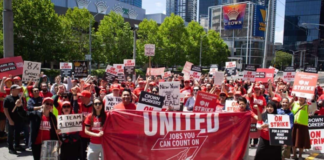In June, the Australian government finalised a Free Trade Agreement with China (ChAFTA), a move hailed as a breakthrough by Liberal politicians and business organisations like the Australian Chamber of Commerce and Industry.
Free Trade Agreements have been a cornerstone of neo-liberal policy over the past three decades. Such agreements are designed to further the rights of big corporations at the expense of workers and the environment.
Similarly, the ChAFTA contains provisions which would allow Australian corporations to sue the Chinese government, or Chinese corporations to sue Australia, if they introduced laws impacting on corporate profits.
Similar provisions, known as Investor State Dispute Settlement mechanisms (ISDS), are currently being negotiated behind closed doors by major corporations and trade bureaucrats finalising the Trans-Pacific Partnership, or TTP.
Australian unions have called protests in response to ChAFTA, focussing on provisions which would see regressive changes and a further expansion of the “457 visa” scheme for temporary migrant workers.
They include an exemption for many Chinese companies from “labour market testing”, i.e. advertising of jobs within Australia first, something otherwise required before the allocation of 457 visas.
Workers on 457 visas require the ongoing sponsorship of an employer to stay in the country, leaving them vulnerable to exploitation and abuse. Under the ChAFTA, the likelihood of exploitation is increased further.
Workers’ terms and conditions will still need to comply with Australian workplace laws, including the Award system. However, on projects worth more than $150 million with a “substantial” (as low as 15 per cent) Chinese interest, conditions can be set by Investment Facilitation Agreements (IFAs), negotiated directly with the Department of Immigration.
Current 457 regulations that could be sidestepped include a requirement for wages to be at least $53,900 a year, as well as labour market testing.
Sydney University economist Stuart Rosewarne has called this, “a radical shift in the institutional context within which the negotiation of employment standards and conditions has traditionally occurred… effectively removing…workers or their unions—from any involvement”.
‘Aussie jobs’ or internationalism?
Rather than campaigning against the potentially exploitative terms of IFAs and demanding workers be represented by unions in wage negotiations, unions have instead framed the issue as one of foreign workers “taking Aussie jobs”.
An AMWU radio advertisement claims the agreement, “lets investors from China bring in their own workers on lower rates of pay… tell Tony Abbott to stand up for Aussie jobs”. A CFMEU TV advertisement similarly says, “Tony Abbott’s deal allows Chinese companies to bring in their own workers, leaving Australian workers without a hope”. Union material and interviews consistently highlight unemployment in Australia, particularly youth unemployment.
But “foreign workers” are not to blame for unemployment. Indeed, migration acts as a stimulus to the economy, helping to create jobs.
Unions seized on a letter from Trade Minister Andrew Robb to his counter-part in China, explaining that under the FTA Chinese workers will no longer be subject to “mandatory skills assessment” for a range of occupations, including electricians. Unions have presented this as exempting Chinese workers from Australian standards.
But China will only be removed from a list of ten countries requiring extra skills assessment, outside the requirements to demonstrate appropriate qualifications in the 457 visa regime that apply to most countries. The 457 test may have problems, but singling out Chinese workers has left unions open to accusations of prejudice.
Indeed the entire 457 visa regime needs to be fought, not by excluding the workers themselves, but by welcoming them into the unions and fighting for equal rights, including the right to permanent residency.
Both the AMWU and CFMEU have done important work fighting for justice for many individual 457 visa workers ripped off by their bosses. But campaigning for “Aussie jobs”, rather than asserting the rights of all workers, regardless of their background, only undermines the solidarity needed to defend wages and conditions.
Not a word has been said about the increased powers in ChAFTA for Australian corporations to exploit workers in China. Instead CFMEU National President Michael O’Connor has positioned himself as a champion of “Australian businesses” allegedly “disadvantaged” by the deal.
Abbott government cuts and corporate profiteering are to blame for job losses, not foreign workers. But sadly, unions have done little to fight these very real attacks. Union-wide mobilisations against Abbott’s budget have been abandoned. There has also been no industrial campaign against the mass sackings at Holden, BP or Australia Post. Grandstanding against “foreign workers” is a far easier option, but it only sets back the fight for jobs.
By Paddy Gibson





